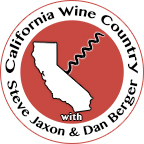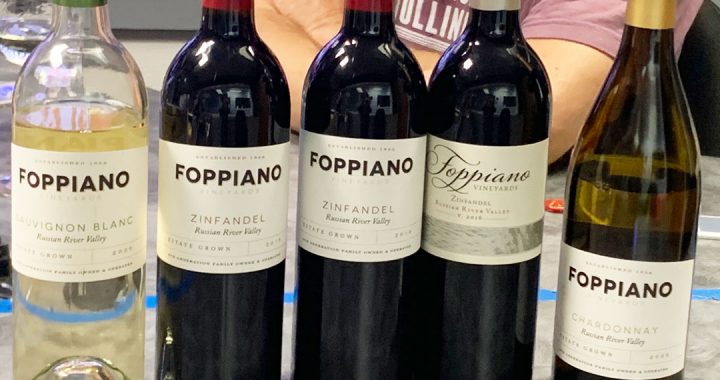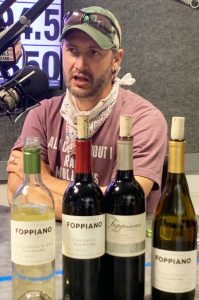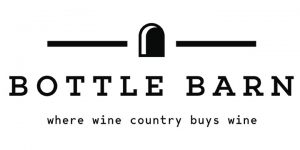Podcast: Play in new window | Download (Duration: 33:31 — 15.3MB) | Embed
Subscribe: Apple Podcasts | RSS | More
Nova Perrill, winemaker at Foppiano Vineyards, is back on California Wine Country with Steve Jaxon and Dan Berger. He has been on this show before, the last time was this episode on April 24, 2019. The pronunciation FOH-ppi-a-no is Italian, FAH-ppi-a-no is American and you can take your pick.
Foppiano winery is at the southern end of the city limits of Healdsburg.There have been grapes on that property for over 125 years. Southbound on the 101, take Old Redwood Hwy, and it’s on your right next to the nursery. They have been there since 1896. They have specialized in Petit Syrah, which they have made since their founding. They were the first to put that name on a bottle in 1964. Family members drew the borders for the Russian River Valley AVA, Louis Foppiano was a leader in that process. This was a big decision, to draw the line between the warmer Dry Creek Valley and the Russian River Valley, which is cooler. During Prohibition, the homeowner was allowed to make 200 gallons each year untaxed. Dan Berger tells about how some people pooled their permits and made more than a single family limit. They also shipped fresh grapes and sacramental wine. They found a way to survive Prohibition. There is a famous photgraph of an IRS “Revenuer” in front of the winery, watching wine being dumped.
Historically, Petit Syrah was the most important variety growing there. Russian River Valley is cool, but not so cool at its northern end, where they are. These wines age well in the bottle. They have fruit all the way until you open them. Nova Perrill has been at Foppiano Vineyards for seven years. He says it takes 5 solid years to get to know the vineyard, the operation and the people. Previously, Nova was the assistant winemaker at Dry Creek Vineyard, established in 1972 by David Stare. He made all the kinds of wine they produce, notably Sauvignon Blanc and Zinfandel. He was there for seven years. Before that, he was at Mt. Eden wines in Santa Cruz, run by Martin Ray. He sold his name to another winery. He was instrumental in passing better wine labeling laws in the 1940s. He himself learned from Paul Masson, who was a Frenchman who had a winery and specialized in sparkling wines. Today there is a top notch music venue on the Paul Masson property. He is a Cal Poly SLO grad, with a bachelor’s in ecology. He took the MS in Crop Science, there, and learned about viticulture, then he applied those concepts at Mt. Eden. He is happy with having taken a hands-on approach from the beginning. All they ever did to the wine was add yeast, the rest was 100% in the vines and climate. That allows the “terroir” to express itself.
Nova has pioneered his vineyard controls and vineyard management techniques. This Sauvignon Blanc will develop itself in the bottle over the next couple of years. Later Dan says it may be even better after 5 years.
They have about 150 acres around the winery. They produce 1000 cases or less of each of these varietals grown on their estate. There is real depth that comes with age in a well-made wine.
“The winemaker has to build this into the wine. It doesn’t just happen.”
Nova Perrill says that their Sauvignon Blanc vines are old and are visible from the 101. Dan Berger gets a little hint of lemon oil or lime and also a bit of fresh fig. Dan would decant it, to let the waxy component come out. Dan says that it’s screw capped, which is good for aging, but means it will need some air to let its flavors out, after it is opened.
Foppiano Vineyards is open for wine tastings, although they are not what they used to be, after the pandemic. Calling ahead is optional. They are open for outdoor tasting.
Now they taste a 2020 Chardonnay. Nova says, if you start with high-quality fruit, all you have to do is not screw it up. “You can only make the wine worse.” There is brightness and complexity in the same bottle here. At first you sense fruit. Or wait a year or two and get more complexity. Or decant it and taste how the air affects it.
They discuss Burgundian style Chardonnays. Nova Perril’s version is Burgundy the region that produces Pinot Noir and Chardonnay. These are the right varietals for that region. For whites, the juice goes right into barrels and is fermented in barrels. Malolactic fermentation will happen and there will be lees contact. Burgundian style will have fruit and oak, viscous, almost oily, oaky, a balance of acid, oak and fruit.



